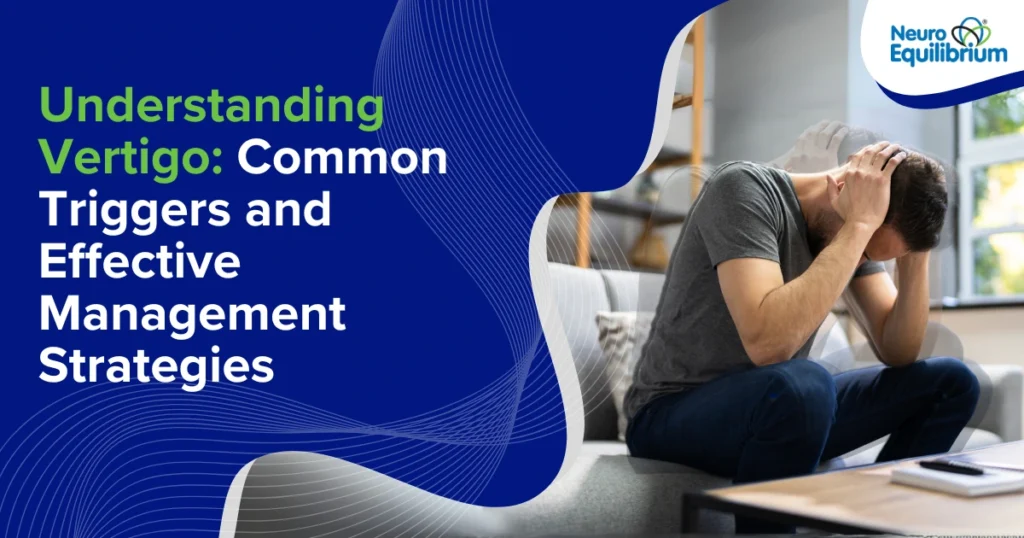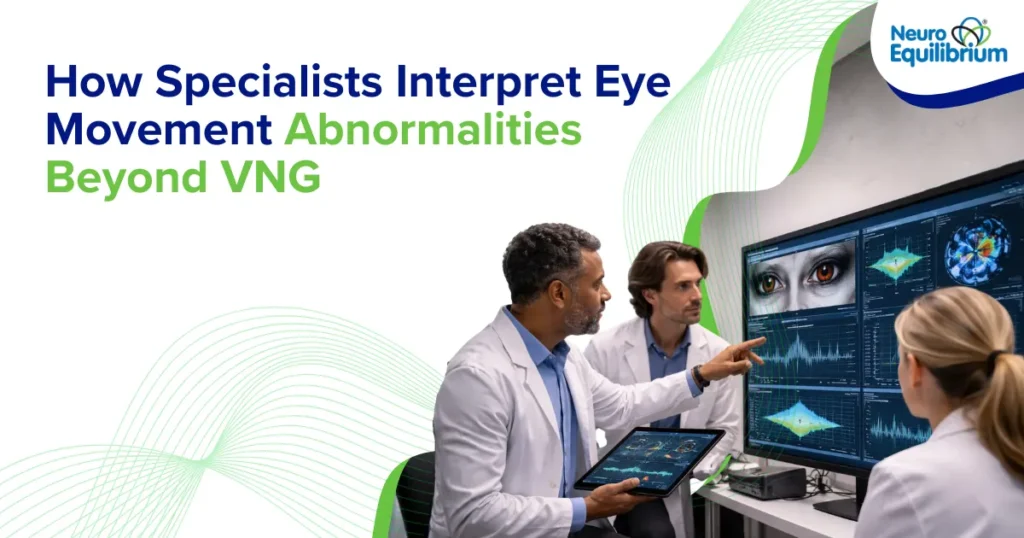Vertigo happens when there’s a problem with your brain or inner ear. It makes you feel like you’re spinning or off-balance because your brain gets mixed signals from your eyes, inner ears, and body.
The specific triggers that cause vertigo differ by the type of vertigo present and individual patient sensitivities. The process of managing and treating vertigo starts with identifying its triggers together with their root causes.
Know More About Vertigo
- What is Vertigo? Causes, Symptoms, & Treatment
- Beware of Falls: The Importance of Fall Prevention in Elderly
- Vertigo and Balance Disorders in Children
Common Triggers and Causes of Vertigo
1. Sudden Head Movement for BPPV
Moving suddenly during bed rest or when standing up frequently triggers vertigo onset. Brief but intense spinning sensations occur mainly in people with Benign Paroxysmal Positional Vertigo (BPPV) after changes in their head position. When in motion, tiny calcium carbonate crystals within the inner ear move, causing a feeling of false movement, thereby confusing the brain and causing dizziness.
2. Dietary Factors for Meniere’s Disease and Vestibular Migrane
Particular foods and beverages tend to make symptoms worse. Fluid retention caused by high sodium intake usually makes vertigo symptoms worse when someone has Ménière’s disease. Caffeine disrupts the fluid balance in the inner ear, potentially triggering migraines and dizziness. Alcohol negatively affects blood pressure and inner ear fluid levels, which can harm balance and induce dizziness as well. Certain foods, such as aged cheeses, chocolate, processed meats, and those containing MSG, trigger vestibular migraines. To maintain stable blood sugar levels and prevent dizziness, it is essential to have balanced and regular meals, as fluctuations in blood sugar can contribute to this feeling effect.
3. Lifestyle Factors
Thoughtful changes in your lifestyle can modify your vertigo symptoms and help you feel better. Relieving stress and anxiety is essential for managing vertigo because these factors can worsen the condition, so find ways to relax, like deep breathing or listening to music. When you experience inadequate or poor-quality sleep, migraines may start, leading to dizziness and balance issues. Gazing at screens for extended periods causes eye strain, leading to headaches and migraines, generating dizziness as a side effect.
4. Underlying Conditions & Other Factors
External factors or medical conditions may disrupt your balance and cause vertigo. Vestibular migraines are a distinct type of migraine that causes dizziness instead of the usual headache symptoms. Infections of the ear, like labyrinthitis or vestibular neuritis, can lead to abrupt dizziness and unsteadiness. Additionally, the side effects of medications used to treat malaria, tuberculosis (TB), and certain antibiotics might impact your balance system by causing dizziness.
5. Motion Sensitivity
Those who experience vertigo find that body movements and exposure to quick-moving objects intensify their symptoms. The sensitivity toward motion becomes more pronounced in patients who experience vestibular migraines. The condition of motion sickness frequently affects vestibular migraine patients who experience difficulties with travel and visually demanding settings.

Can Stress Cause Vertigo?
Yes, stress and anxiety can trigger or worsen vertigo. If your daily life is stressful, it can contribute to dizziness and balance issues in several ways:
- Stress-Triggered Conditions: Stress can lead to vestibular migraines or other stress-induced disorders that cause vertigo.
- Exacerbation of Symptoms: If you already experience vertigo, stress can intensify your symptoms, making them more severe and persistent.
- Impact on Balance Disorders: Stress is a major lifestyle factor that can trigger vertigo, especially in individuals prone to balance-related conditions.
Since stress plays a key role in worsening vertigo, effective stress management—through relaxation techniques, meditation, breathing exercises, or counseling—can help reduce the frequency and intensity of symptoms.
Conclusion
The key elements to control dizziness and improve balance include trigger detection and timely management. The control of vertigo symptoms becomes possible through diet changes alongside stress management techniques and the avoidance of specific movements. Accurate diagnosis and appropriate medical care lead to both long-term relief and a better quality of life.
NeuroEquilibrium specializes in advanced vertigo diagnosis and treatment, offering expert care to help you regain control and improve your balance. If you’re struggling with vertigo, reach out to NeuroEquilibrium for a personalized treatment plan.
Sources
- Stanton M., et al. (2023). Vertigo in Clinical Practice: Evidence-Based Diagnosis and Management. NCBI Bookshelf. https://www.ncbi.nlm.nih.gov/books/NBK482356/ (NCBI)
- “7 Common Triggers of Vertigo.” Hackensack Meridian Health. 2023. https://www.hackensackmeridianhealth.org/en/healthu/2023/06/28/7-common-triggers-of-vertigo (hackensackmeridianhealth.org)
- “Vertigo.” NHS. https://www.nhs.uk/conditions/vertigo/ (nhs.uk)
- “Dizziness and Vertigo.” MSD Manuals (ENT Disorders). https://www.msdmanuals.com/home/ear-nose-and-throat-disorders/symptoms-of-ear-disorders/dizziness-and-vertigo (MSD Manuals)
- “Vertigo: Symptoms, Causes, Treatment & More.” Healthline. https://www.healthline.com/health/vertigo (Healthline)
- “Vertigo — Symptoms, Causes & Treatments.” Healthdirect. https://www.healthdirect.gov.au/vertigo (Health Direct)
- “Vestibular Disorders — Causes & Management.” MedlinePlus. https://medlineplus.gov/ency/article/001432.htm (MedlinePlus)
- “Vertigo — Causes, Symptoms, & Treatment.” Apollo Hospitals (India). https://www.apollohospitals.com/diseases-and-conditions/vertigo (Apollo Hospitals)
What is vertigo?
Vertigo is a feeling of spinning or whirling, often referred to as “chakkar.” This medical condition is a symptom arising from issues in the inner ear and brain that affect balance. Key causes of vertigo include Benign Paroxysmal Positional Vertigo, vestibular migraines, Meniere’s disease, and ear infections. Effective treatment relies on accurate medical understanding and diagnosis.
Book a consultation at your nearest NeuroEquilibrium Clinic today.
What are the most common triggers of vertigo?
The causes of vertigo can be triggered by swift head motions as well as high sodium diets while drinking alcohol and caffeine and experiencing stress and sleep problems and spending too much time in front of screens and performing certain exercises and dealing with medical issues and being responsive to motion.
Book a consultation at your nearest NeuroEquilibrium Clinic today.
Can dietary habits influence vertigo symptoms?
Yes, certain foods together with beverages such as high-sodium foods, caffeine, alcohol, aged cheese, chocolate, and processed meats can intensify vertigo symptoms, primarily affecting people with Ménière’s disease or vestibular migraines.
Book a consultation at your nearest NeuroEquilibrium Clinic today.
How can stress contribute to vertigo?
The combination of stress and anxiety leads to worsened vertigo symptoms because they stress the nervous system enough to trigger vestibular migraines. People can reduce symptoms through relaxation techniques, meditation, breathing exercises, and stress management.
Book a consultation at your nearest NeuroEquilibrium Clinic today.
What lifestyle changes can help manage vertigo effectively?
Individuals with vertigo can benefit from managing their symptoms by maintaining a balanced diet, ensuring regular sleep patterns, limiting screen time, controlling stress, and avoiding specific activities that trigger vertigo attacks.
Book a consultation at your nearest NeuroEquilibrium Clinic today.
















